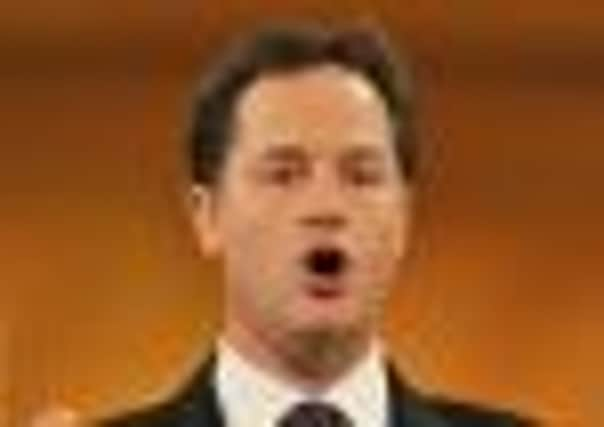UK told ‘tax the rich to tackle income gap’


Research by the Organisation for Economic Co-operation and Development (OECD) found on average the highest earners in the UK receive nearly 12 times as much as the lowest earners.
The organisation has recommended that the British government, along with other national administrations, imposes higher taxes on the rich to tackle the growing inequality.
Advertisement
Hide AdAdvertisement
Hide AdThe report has come just after Lib Dem Deputy Prime Minister Nick Clegg pledged to tackle “abhorrent” executive pay in a week when almost two million public sector workers went on strike over pay restraint and plans to change their pensions.
Its findings are likely to provoke further splits in the coalition with the Lib Dems pushing for higher taxes on the rich, but many Tories wanting the top rate of 50 pence in the pound for those earning more than £150,000 to be scrapped.
The OECD report said that sharp increases in income inequality, which began in 2005 after a five-year decline from 2000, has left Britain well above the group’s average.
The study, Divided We Stand: Why Inequality Keeps Rising, said the annual average income of the top 10 per cent was almost £55,000 in 2008, nearly 12 times higher than that of the bottom 10 per cent, who earned an average of £4,700.
This is up from a ratio of eight to one in 1985, the OECD said.
In order to combat the problem, the OECD said: “Work is the most promising way of tackling inequality.
“The biggest challenge is creating more and better jobs that offer good career prospects and a real chance to people to escape poverty.”
It said investing in “human capital” is vital. “This must begin from early childhood and be sustained through compulsory education,” it concluded.
Advertisement
Hide AdAdvertisement
Hide Ad“Once the transition from school to work has been accomplished, there must be sufficient incentives for workers and employers to invest in skills throughout the working life.”
Data showed the money earned by the country’s top 1 per cent of earners doubled from 7.1 per cent of the total UK income in 1970 to 14.3 per cent in 2005.
Just prior to the global recession, the top 0.1 per cent of top earners accounted for 5 per cent of total pre-tax income. At the same time, the top marginal income tax rate saw a marked decline, dropping from 60 per cent in the 1980s to 40 per cent in the 2000s, before its increase to 50 per cent.
The report was welcomed by union leaders who said it highlighted their concerns that the poor are being asked to pay for austerity measures.
Rail Maritime and Transport union leader Bob Crow said: “Far from all being in it together, the rich are getting richer while working families are taking the biggest hit on their standards of living since wartime rationing.
“This government continues to pedal the lie that we are all sharing the pain, while the boardrooms are awash with cash and those whose rampant greed created the crisis are laughing all the way to the bank.”
However, the government last night insisted that the British public are “all in it together” in sharing the pain of the austerity measures and said that the picture painted by the OECD was not totally clear.
A government spokesman said: “The OECD recognises that the causes of inequality are complex.
Advertisement
Hide AdAdvertisement
Hide Ad“As we have seen, just putting billions of pounds into the tax and benefit system cannot alleviate poverty on its own and has the perverse effect of trapping thousands of families in a life on benefits.
“The OECD rightly points out that governments need to facilitate and encourage employment of low income groups – something we are directly focusing on through the Work Programme and Universal Credit.
“Our wide-ranging reforms will have a dramatic impact on the poorest families, improving the life chances of children at an early age and lifting almost a million people out of poverty through the Universal Credit.
While the gap had widened more quickly in the UK than other countries it was not at its overall highest level in Britain.
According to the OECD report the UK’s pay gap figure was just under 0.35 on a mathematical scale before the financial crisis, higher than the OECD average of 0.316. This figure was much lower than the United States, Mexico and Chile, which had the highest level of inequality in 2008 at a coefficient of almost 0.5.
The lowest figure was for Slovenia with a coefficient of just over 0.2.
Income inequality has crept up against the backdrop of a period of steady growth in the UK until the financial crisis of 2008.